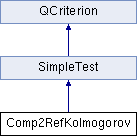


|
 |
Comparison to reference using the Kolmogorov algorithm. More...
#include <QTest.h>

Public Member Functions | |
| Comp2RefKolmogorov (const std::string &name) | |
| float | runTest (const MonitorElement *me) |
Static Public Member Functions | |
| static std::string | getAlgoName (void) |
Comparison to reference using the Kolmogorov algorithm.
| Comp2RefKolmogorov::Comp2RefKolmogorov | ( | const std::string & | name | ) | [inline] |
Definition at line 212 of file QTest.h.
References getAlgoName(), and QCriterion::setAlgoName().
: SimpleTest(name) { setAlgoName(getAlgoName()); }
| static std::string Comp2RefKolmogorov::getAlgoName | ( | void | ) | [inline, static] |
Definition at line 216 of file QTest.h.
Referenced by Comp2RefKolmogorov(), QTestConfigure::EnableComp2RefKolmogorovTest(), QTestConfigure::enableTests(), and QTestParameterNames::QTestParameterNames().
{ return "Comp2RefKolmogorov"; }
| float Comp2RefKolmogorov::runTest | ( | const MonitorElement * | me | ) | [virtual] |
Reimplemented from QCriterion.
Definition at line 293 of file QTest.cc.
References newFWLiteAna::bin, gather_cfg::cout, MonitorElement::DQM_KIND_TH1D, MonitorElement::DQM_KIND_TH1F, MonitorElement::DQM_KIND_TH1S, MonitorElement::DQM_KIND_TPROFILE, first, MonitorElement::getRefRootObject(), MonitorElement::getRefTH1D(), MonitorElement::getRefTH1F(), MonitorElement::getRefTH1S(), MonitorElement::getRefTProfile(), MonitorElement::getRootObject(), MonitorElement::getTH1D(), MonitorElement::getTH1F(), MonitorElement::getTH1S(), MonitorElement::getTProfile(), h, MonitorElement::kind(), prof2calltree::last, siStripFEDMonitor_P5_cff::Max, indexGen::s2, w2, and z.
{
const double difprec = 1e-5;
if (!me)
return -1;
if (!me->getRootObject() || !me->getRefRootObject())
return -1;
TH1* h=0;
TH1* ref_=0;
if (verbose_>1)
std::cout << "QTest:" << getAlgoName() << "::runTest called on "
<< me-> getFullname() << "\n";
//-- TH1F
if (me->kind()==MonitorElement::DQM_KIND_TH1F)
{
h = me->getTH1F(); // access Test histo
ref_ = me->getRefTH1F(); //access Ref histo
}
//-- TH1S
else if (me->kind()==MonitorElement::DQM_KIND_TH1S)
{
h = me->getTH1S(); // access Test histo
ref_ = me->getRefTH1S(); //access Ref histo
}
//-- TH1D
else if (me->kind()==MonitorElement::DQM_KIND_TH1D)
{
h = me->getTH1D(); // access Test histo
ref_ = me->getRefTH1D(); //access Ref histo
}
//-- TProfile
else if (me->kind()==MonitorElement::DQM_KIND_TPROFILE)
{
h = me->getTProfile(); // access Test histo
ref_ = me->getRefTProfile(); //access Ref histo
}
else
{
if (verbose_>0)
std::cout << "QTest:Comp2RefKolmogorov"
<< " ME does not contain TH1F/TH1S/TH1D/TProfile, exiting\n";
return -1;
}
//-- isInvalid ? - Check consistency in number of channels
int ncx1 = h->GetXaxis()->GetNbins();
int ncx2 = ref_->GetXaxis()->GetNbins();
if ( ncx1 != ncx2)
{
if (verbose_>0)
std::cout << "QTest:Comp2RefKolmogorov"
<< " different number of channels! ("
<< ncx1 << ", " << ncx2 << "), exiting\n";
return -1;
}
//-- isInvalid ? - Check consistency in channel edges
double diff1 = TMath::Abs(h->GetXaxis()->GetXmin() - ref_->GetXaxis()->GetXmin());
double diff2 = TMath::Abs(h->GetXaxis()->GetXmax() - ref_->GetXaxis()->GetXmax());
if (diff1 > difprec || diff2 > difprec)
{
if (verbose_>0)
std::cout << "QTest:Comp2RefKolmogorov"
<< " histograms with different binning, exiting\n";
return -1;
}
//-- QUALITY TEST itself
Bool_t afunc1 = kFALSE; Bool_t afunc2 = kFALSE;
double sum1 = 0, sum2 = 0;
double ew1, ew2, w1 = 0, w2 = 0;
int bin;
for (bin=1;bin<=ncx1;bin++)
{
sum1 += h->GetBinContent(bin);
sum2 += ref_->GetBinContent(bin);
ew1 = h->GetBinError(bin);
ew2 = ref_->GetBinError(bin);
w1 += ew1*ew1;
w2 += ew2*ew2;
}
if (sum1 == 0)
{
if (verbose_>0)
std::cout << "QTest:Comp2RefKolmogorov"
<< " Test Histogram: " << h->GetName()
<< ": integral is zero, exiting\n";
return -1;
}
if (sum2 == 0)
{
if (verbose_>0)
std::cout << "QTest:Comp2RefKolmogorov"
<< " Ref Histogram: " << ref_->GetName()
<< ": integral is zero, exiting\n";
return -1;
}
double tsum1 = sum1; double tsum2 = sum2;
tsum1 += h->GetBinContent(0);
tsum2 += ref_->GetBinContent(0);
tsum1 += h->GetBinContent(ncx1+1);
tsum2 += ref_->GetBinContent(ncx1+1);
// Check if histograms are weighted.
// If number of entries = number of channels, probably histograms were
// not filled via Fill(), but via SetBinContent()
double ne1 = h->GetEntries();
double ne2 = ref_->GetEntries();
// look at first histogram
double difsum1 = (ne1-tsum1)/tsum1;
double esum1 = sum1;
if (difsum1 > difprec && int(ne1) != ncx1)
{
if (h->GetSumw2N() == 0)
{
if (verbose_>0)
std::cout << "QTest:Comp2RefKolmogorov"
<< " Weighted events and no Sumw2 for "
<< h->GetName() << "\n";
}
else
{
esum1 = sum1*sum1/w1; //number of equivalent entries
}
}
// look at second histogram
double difsum2 = (ne2-tsum2)/tsum2;
double esum2 = sum2;
if (difsum2 > difprec && int(ne2) != ncx1)
{
if (ref_->GetSumw2N() == 0)
{
if (verbose_>0)
std::cout << "QTest:Comp2RefKolmogorov"
<< " Weighted events and no Sumw2 for "
<< ref_->GetName() << "\n";
}
else
{
esum2 = sum2*sum2/w2; //number of equivalent entries
}
}
double s1 = 1/tsum1; double s2 = 1/tsum2;
// Find largest difference for Kolmogorov Test
double dfmax =0, rsum1 = 0, rsum2 = 0;
// use underflow bin
int first = 0; // 1
// use overflow bin
int last = ncx1+1; // ncx1
for ( bin=first; bin<=last; bin++)
{
rsum1 += s1*h->GetBinContent(bin);
rsum2 += s2*ref_->GetBinContent(bin);
dfmax = TMath::Max(dfmax,TMath::Abs(rsum1-rsum2));
}
// Get Kolmogorov probability
double z = 0;
if (afunc1) z = dfmax*TMath::Sqrt(esum2);
else if (afunc2) z = dfmax*TMath::Sqrt(esum1);
else z = dfmax*TMath::Sqrt(esum1*esum2/(esum1+esum2));
// This numerical error condition should never occur:
if (TMath::Abs(rsum1-1) > 0.002)
if (verbose_>0)
std::cout << "QTest:Comp2RefKolmogorov"
<< " Numerical problems with histogram "
<< h->GetName() << "\n";
if (TMath::Abs(rsum2-1) > 0.002)
if (verbose_>0)
std::cout << "QTest:Comp2RefKolmogorov"
<< " Numerical problems with histogram "
<< ref_->GetName() << "\n";
return TMath::KolmogorovProb(z);
}
 1.7.3
1.7.3